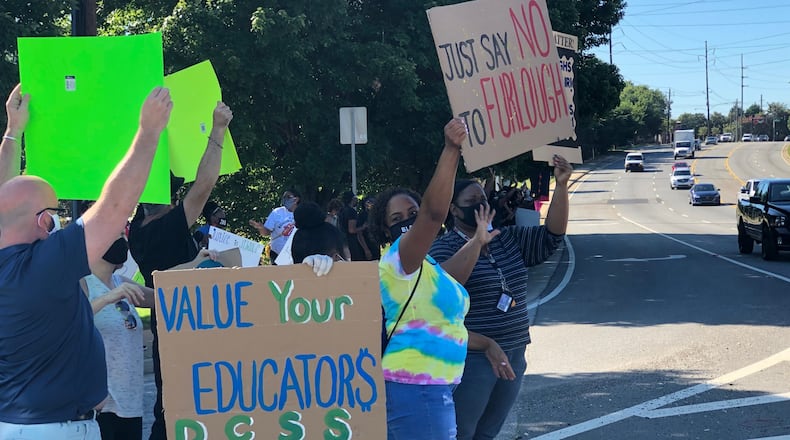Lisa Morgan is president of the Georgia Association of Educators, an organization that aims to support the state’s public school teachers, administrators and support staff. Morgan was a classroom teacher for 21 years. An early childhood educator, she has taught pre-kindergarten, kindergarten and first grade.
Morgan’s column sets a list of priorities for the Legislature, which starts Jan. 8. Her essay is part of an Atlanta Journal-Constitution series in which education advocates offer guidance ahead of the 2024 session starting next month.
By Lisa Morgan
Get ready, taxpayers of Georgia. Private school lobbyists are once again trying to get into your pockets.
They want you and your family to foot the bill for the tuition and fees of their children.
They propose to pay for it by stripping funding that would have otherwise gone to support our community-based, local public schools and redirecting it to the benefit of wealthier students so they can continue to attend private schools.
It’s a scam. It’s dishonest and unfair. Taxpayers and parents should be furious. Taxpayers lose, students lose and our public schools lose.
Last year, a cadre of private school special interests nearly succeeded in their scheme to rob students in Georgia’s poorest public schools of nearly $300 million a year. The bill actually proposed taking funding away from the poorest schools in Georgia to give to more privileged families to pay for their children’s private school education. (Only students in the lowest-achieving 25% of public schools, based mostly on Georgia Milestones test scores, would have been eligible.)
While they’re pushing this massive and radical private-school funding scam, they will also be back to increase a tax break that individuals and businesses get for donations for private schools — more taxpayer dollars going to fund private schools — to $130 million a year.
Do we really need to be giving taxpayer-funded handouts to wealthy donors to private schools? Of course not.
Meanwhile, public school funding will suffer another year of “basic” funding under the unfortunately but aptly named the Quality Basic Education Act and under a state Constitution that requires the Georgia General Assembly provide for “an adequate public education.”
It is a shame that our standards are so low. Adequate. Basic.
We fail our kids with such low standards.
The truth is current funding levels for our schools are NOT adequate. We speak of “fully funding QBE” as if that is some remarkable achievement. It is not, especially when we consider that the formula was signed into law in 1985.
“Fully funding QBE” means nothing more than the minimal level of funding that keeps the doors to our schools open. It is not aspirational. It is basic, not exceptional. “Adequate” and “basic” are not synonyms for “quality” or “excellent.”
The sad news is that this “basic” level of funding has only been achieved three times in the past 20 years. In that period, $10 billion has been cut from public education in Georgia by the state General Assembly.
Yet we pat ourselves on the back and say, ”Hurray! We fully funded QBE.” Basic and adequate are not to be congratulated. While we congratulate ourselves on “fully funding QBE,” some attack our public education system as a failure.
If our schools are failing, it is because we have not invested in them. We have not given educators and students the resources they need to succeed.
We also allow school systems to avoid compliance with the laws and high standards the Legislature enacts. School district “waivers” let school systems ignore almost every law legislators pass. It’s a curious process and a perversion of the legislative process. It is also harmful to our students. Local school districts essentially have a “veto” power over the Legislature.
As an example, legislators have passed laws regulating class size. State law specifically establishes the maximum number of students per class, which is too high anyway. But local districts that don’t want to follow this law merely ask the unelected State Board of Education for a waiver. The state and the local school district are unwilling to come up with the necessary funding to lower class sizes, so they cram more kids into a classroom to save more … at the expense of our students.
All waiver requests are granted. None have been denied. Every school district in Georgia has a “waiver” to ignore class size maximums but for two that haven’t asked for it.
Waivers for special education, gifted programs, and English for Speakers of Other Languages (ESOL) classes also allow districts to increase the number in those classes as well.
School systems can also “waive” minimum teacher salaries set by the state, hire uncertified teachers, eliminate teachers’ fair dismissal rights, nepotism laws, bus safety laws, duty-free lunch and “any other(s) identified by the local school system and approved by the state board.”
Raises intended for teachers, such as those recently enacted by Gov. Brian Kemp and passed by the Legislature, could be spent on landscaping at the central office or redirected to increase the pay of administrators under waiver laws now in place.
I appreciate that Kemp has proposed and passed salary increases for teachers by $7,000. But even with the increases, teachers in Georgia are making less today than they did 23 years ago when adjusted for inflation. Starting salaries for teachers in Georgia are lower than those in Alabama, Florida, Louisiana and Texas. The salary for a beginning teacher actually ranks 35th in the nation.
Let’s stop spending taxpayers’ hard-earned dollars to support private schools. Let’s not steal money from public schools to prop up private academies. Let’s fund our local schools in a way that lets our students shine. Let’s end “waivers” that cheat our children out of the education they deserve.
About the Author



